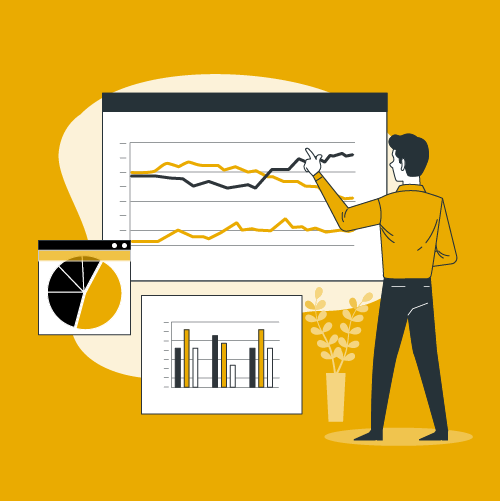- What is Business Intelligence?
- 1. Uber
- 2. Netflix
- 3. Coca Cola Bottling Company
- 4. Lowe's Corp
- 5. American Express
- What is Business Analytics?
- 1. Microsoft
- 3. Amazon
- Business Intelligence vs Business Analytics - A Comparative View
- Advantages of BI & BA for Businesses
- Determine your Organization’s BI and BA Needs
- FAQs
- Q2. What are some Business Intelligence use cases?
- Q3. What are the three types of business analytics?
- Conclusion
There’s no denying that businesses create an overwhelming amount of data every day. In order to make smarter business decisions, identify problems, and maintain profitability, it’s crucial to use digital tools and solutions to turn your data into actionable insights. While many options are available, Business Intelligence and Business Analytics are the two most commonly used data management solutions that help gather, evaluate, and display key business information.
By utilizing these two digital solutions, organizations gain valuable insights into industry trends and enable a strategic decision-making approach.
Here are a few stats that show the increasing use of Business Intelligence and Business Analytics:
- As per Statista, the market size for business intelligence and analytics software applications is expected to increase from 14.9 billion U.S. dollars in 2019 to 17.6 billion in 2024.
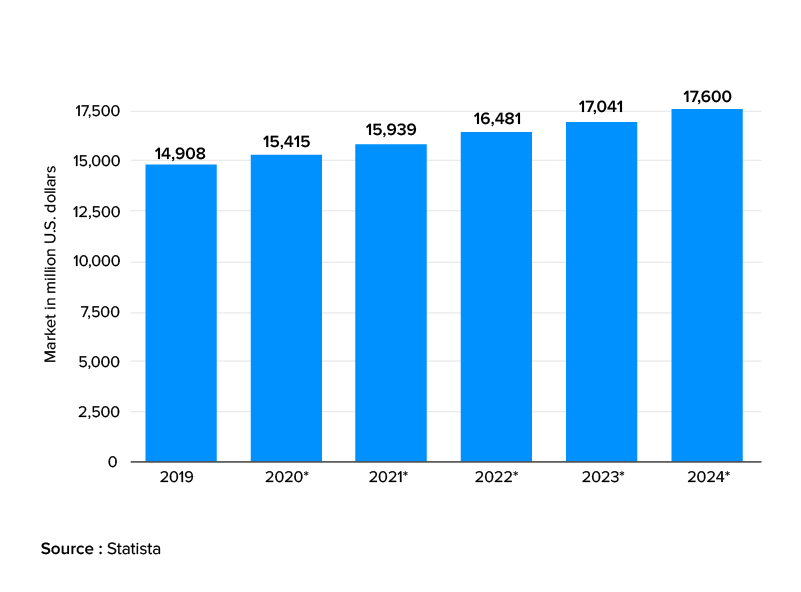
- According to a survey by Forbes, 48% of organizations consider cloud BI either ‘critical’ or ‘very important’ to their operations.
- As per PR News Wire, North America is predicted to have the largest business intelligence and analytics market share due to the presence of key industry players in the area.
Now that we have seen important stats related to BI and BA, let’s understand the concepts in detail and know how and why Business Analytics and Business Intelligence solutions are important for your organization. Let us also understand the difference between Business Analytics and Business Intelligence to know which of the solutions is more viable for your organization.
What is Business Intelligence?
Business intelligence (BI) is a technology that enables businesses to organize, analyze, and contextualize business data from around the company. BI provides reports, performance measures, and company trends that help businesses make informed decisions in the present day. It is mostly used as a way to generate a detailed overview either on business or product metrics.
Here are some real-world examples that show how BI is making a difference for companies around the world:

1. Uber
The company uses Business Intelligence to determine multiple core aspects of its business. For instance, Uber uses BI for surge pricing. Algorithms monitor the time of journey, traffic conditions, and customer’s demand in real-time. So, prices adjust as demand rises and traffic conditions change.
2. Netflix
Netflix uses data in multiple ways. One example is how the company offers suggestions to users based on previously viewed programs. Netflix also uses Business Intelligence to get people to engage with its content.
[Also Read: Revealed – The Actual Netflix-like App Development Cost]
3. Coca Cola Bottling Company
Coca-Cola previously had issues with its daily manual reporting processes. But by replacing the process with an automated BI system, the company completely streamlined the process and saved 260 hours a year. Now, the company can quickly check metrics related to budget, delivery, and profitability with just a few clicks.
4. Lowe’s Corp
The home improvement company is one of the earliest adopters of BI tools. They have used this technology to optimize their supply chain, analyze products to identify potential fraud, and solve problems.
5. American Express
American Express has been using BI to develop new payment service products and market offers to customers. BI also helps the company to detect any financial fraud and protect customers whose card data may be compromised.
What is Business Analytics?
Business Analytics (BA) is used to interpret and analyze historical data to identify trends and patterns in the business. BA helps companies to improve or change their current operations and make better decisions for the future. It can be used to recognize market opportunities, improve relationships with customers and better indicate potential risks.
Let’s understand this better with the help of some real-world examples:
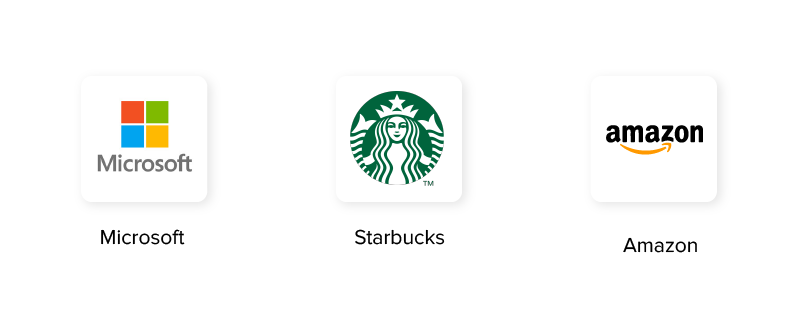
1. Microsoft
Microsoft used Business Analytics in 2015 when their engineering groups’ offices moved. Microsoft’s Workplace Analytics team hypothesized that moving the 1,200-person group from five buildings to four could improve collaboration by cutting down on the number of employees per building and reducing the distance that staff needed to travel for meetings. This move saved 100 hours of work per week and they gained a net saving of 520,000 USD per year in terms of employee time.
2. Starbucks
Starbucks uses BA to predict the purchases and offers a customer is likely to be interested in. Using BA tools, the company is able to identify the pattern in a customer’s purchase and then suggest offers through mobile devices.
[Also Read: A 10 Minute Guide on Using Predictive Analytics for Mobile Apps]
3. Amazon
The most popular on-demand app, Amazon has successfully used Business Analytics to personalize product recommendations and make logistical business decisions. Amazon’s massive supply chain runs smoothly due to in-depth data analysis.
Now that we know what is Business Analytics and what is Business Intelligence, let’s move on to the next part of this article where we will compare BI and BA to see which is a better fit for your organization.
Business Intelligence vs Business Analytics – A Comparative View
While choosing between Business Intelligence and Business Analytics, business leaders must do a comparative analysis of these solutions. Here are a few comparison points that will help you choose the right solution for your business.
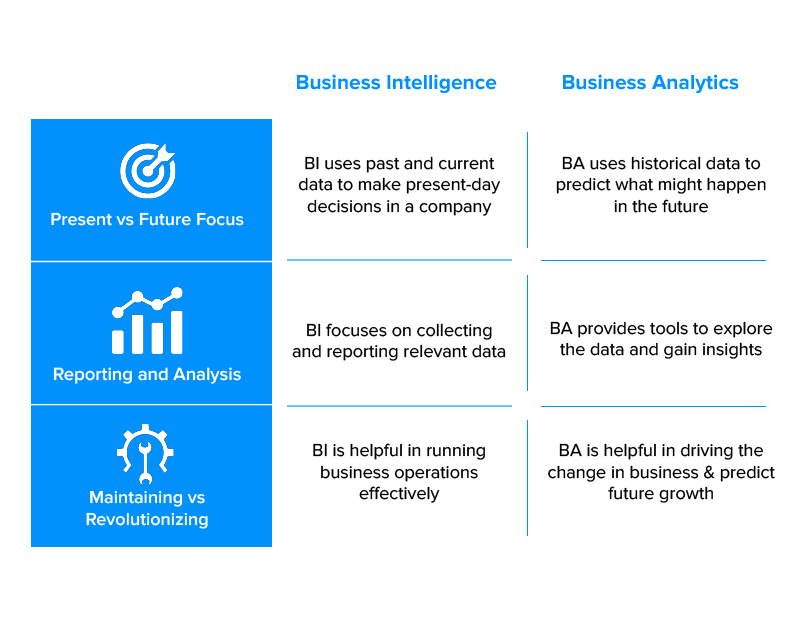
1. Present vs Future Focus: Business Intelligence uses past and current data to make decisions about how a company should run in the present day. Business Analytics, on the other hand, uses historical data to predict what might happen in the future or how an organization can move forward.
A present focus using BI is generally more useful for entrepreneurs who are satisfied with current business operations but want to identify ‘pain points’, increase productivity and streamline processes. But for those, who want to change any major functioning or business model, Business Analytics is a better choice to get useful insights.
2. Reporting and Analysis: Business Intelligence mainly focuses on collecting and reporting relevant data. The trend in analytics has been instead to provide people with the tools to get their own answers. BA lets people get in the flow of analysis, explore their data, and ask their own questions.
3. Maintaining vs Revolutionizing: BI is needed to run the business while BA is needed to drive a change in the business.
BI focuses on creating operational efficiency via real-time data enabling individuals to most effectively perform their job functions. BI also includes analysis of historical data from multiple sources enabling problem identification and resolution.
Business Analytics relates to the exploration of historical data to identify trends and understand the information that can drive business change and support sustained successful business practices.
4. Ease in Decision Making: Large-scale businesses depend almost entirely on their skilled team of analysts who can predict challenges or market fluctuations. While an analyst is able to access all the information with the help of business intelligence tools, translating this intelligence into a useful resource is not possible without analytics.
Business analytics help identify growth patterns, economic shifts, and future market trends on the basis of historical data and the current functionality of the business. So, when it comes to forming major decisions, the analytical perspective is most crucial because it doesn’t just tell you about an enterprise’s current state but can also see ahead.
5. Applications: Business Intelligence is used by most of the companies to run current business operations. For example, if you’d like to reach a certain sales goal, your BI system can analyze previous months of data and suggest a reasonable goal based on past performance.
Business Analytics applies to companies that see future growth and productivity as their main goals. BA gives you the tools to process data, answer the question to ‘why’, and create future actionable items. You can apply business analytics across all verticals of a business. It can be applied to marketing, finance, CRM, Human Resource Management, and even manufacturing.
Advantages of BI & BA for Businesses
Business Intelligence is useful for companies to stay competitive and maximize revenue streams. Here are the key benefits that BI offers to organizations:
- Improves business operations: Organizations that use BI have greater control over their operations. They have a better understanding of what’s going on in the company. Maintaining active monitoring over processes and standard procedures aids in the rapid correction of any errors.
For instance, a logistics company can use BI to deal with late deliveries and know why the delays are occurring. This kind of knowledge in their operations could help the company vastly improve their services. - Valuable customer insights: Businesses can better understand their clients by evaluating their purchasing behaviors and establishing user profiles using effective business intelligence systems. Many organizations are looking for custom software development solutions to help them with BI systems and management. This enables them to provide their customers with better products and experiences.
- Improved productivity: One of the major benefits of Business Intelligence tools is the automation of processes such as report generation and real-time updation. As a result, the employees can focus on more productive tasks.
- Increased revenue: Data from BI tools can help businesses to identify sales weaknesses and identify other problems. When organizations are listening to their customers, watching their competitors, and improving their operations, revenue is more likely to increase.
- Competitive advantage: Another significant advantage of having a BI solution is competitive advantage. Business intelligence platform allows companies to see what their competitors are up to and make informed and educated judgments about their plans.
For example, in the fashion industry, the most important benefit of business intelligence is to identify important trends. Companies can use business intelligence tools to figure out what kind of audience they need to appeal to.
Business Analytics can help organizations to increase overall efficiency and mitigate and identify potential risks. Let’s look at the key benefits of Business Analytics:
- Keeps businesses on a budget: Most startups and small-scale companies have tight marketing budgets. The use of Business Analytics helps you maximize every dollar by helping you understand your customers better, anticipating their ever-changing needs, and bringing innovative solutions to the marketplace.
- Informed decision-making: Enterprises can use business analytics to make informed business decisions and minimize financial losses. Predictive analytics can be used to close business gaps and respond to changes.
For instance, businesses can model changes to pricing or product offerings to determine how those changes would affect customer demand. Additionally, businesses can also leverage location intelligence to create a powerful system that can assist them in discovering effective business solutions. Know more details on the subject in our latest blog post on Multiple Ways Location Intelligence Benefits Your Enterprise.
- Increased efficiency: Nowadays, businesses can collect data at lightning-fast speed. With the help of business analytics, you can identify any breakdown in the process or performance in almost real-time, thus saving time, money, and resources.
- Staying in the know: Business owners use BA to track customer behavior, changes in customers’ needs, and market shifts. This data helps to keep you on top of things and make changes dynamically when and if supporting data indicates it’s time.
Determine your Organization’s BI and BA Needs
Well, if you are deciding to choose between BA and BI, I would say that a business needs both technologies to succeed. So when choosing the technologies and tools you want to invest in, you should focus less on Business Intelligence vs Business Analytics and more on what you need the data system to do and who will be using it.
If you are satisfied with your business model and just want to improve operations, increase efficiency and meet your organizational goals, BI may be an optimal choice for you. On the other hand, if you want to change your business processes – or even your entire business model – but don’t have the necessary insights, BA might be the best option. It’s better to start with BI and then move towards BA to improve efficiency and generate more revenue. In short, business analytics and business intelligence solutions can help you take your business where you want it to go.
FAQs
Q1. What is Business Intelligence used for?
BI refers to technologies, strategies, and practices used to collect, analyze, and present pertinent business information. The entire purpose of Business Intelligence is to help businesses in better business decision-making.
Q2. What are some Business Intelligence use cases?
Some business intelligence use cases are:
- Analytics
- Dashboard development
- Data mining
- Process mining
- Business performance management
- Text mining
- Predictive analytics
- Prescriptive analytics
- Data visualization
Q3. What are the three types of business analytics?
The three types of business analytics are:
- Descriptive analytics
- Predictive analytics
- Prescriptive analytics
Conclusion
There’s no doubt that the future of Business Analytics and Business Intelligence is bright. Both BA and BI help companies to analyze data in order to make better and informed decisions. While BI tools are getting more powerful and providing advanced capabilities, data professionals are still needed for predictive business analytics. The best strategy is to first focus on business intelligence and then incorporate business analytics to improve efficiency, revenue generation, and productivity moving forward.
In case you still have any questions regarding BI and BA or want to know which platform you should invest in, feel free to contact an esteemed business intelligence service provider like us.


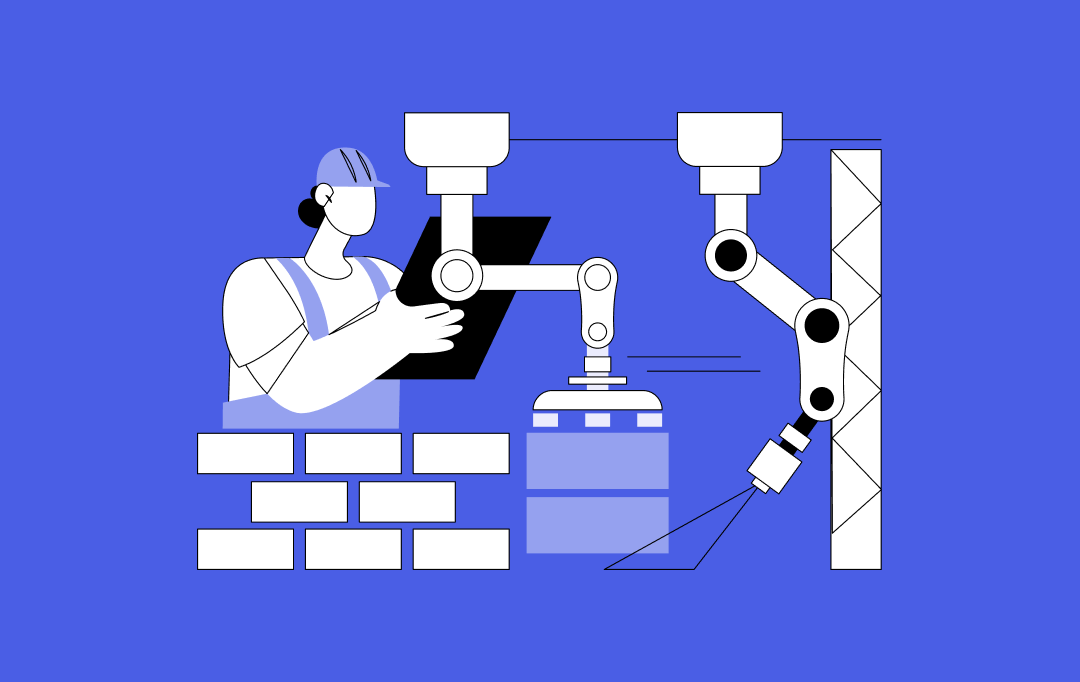
How Business Intelligence is Driving Data-Driven Decisions in Manufacturing
As the manufacturing sector becomes increasingly intricate, leveraging data effectively has never been more critical. Manufacturers today navigate a labyrinth of processes, technologies, and human capital, all while striving for greater efficiency and innovation. This is where business intelligence for manufacturing emerges as a game-changer. By transforming complex datasets into actionable insights, BI enables organizations…

How data mining helps in business intelligence
Data is the life-powering proverbial blood that empowers the corporate economy of the 21st century. And although it may incite fanciful scenarios to mind with a mere mention, the truth is data is key to unlocking human productivity in every sphere of life. Climate change, business failures, epidemics, and crop production, all can be understood…
